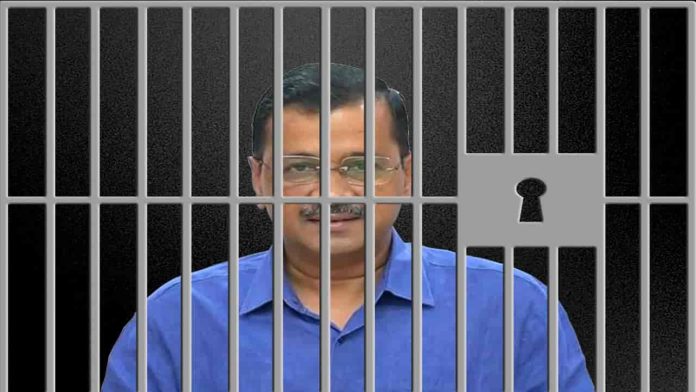Can Arvind Kejriwal continue to act as chief minister while sitting in jail? He has not even applied for a bail at an appropriate court, but is only challenging the grounds of his arrest. What is the legal process involved?
By Satya Muley
A Special Court at Delhi denied the request of Arvind Kejriwal to meet his lawyers five times during the week, instead of two times per week, citing the reason that the Delhi chief minister is not even utilizing the permitted two meetings per week with his lawyers solely for discussing pending litigations, and has rather used the allotted time for passing orders through his lawyers. Daily video consultation with his family doctor has also been denied by the Court citing availability of medical support at the jail.
The Aam Aadmi Party (AAP) is currently facing an unprecedented situation where its top three leaders are in jail, while one (Raghav Chadha) is out of the country since early March 2024. Only recently, Sanjay Singh has been granted bail by the Supreme Court, albeit only due to non-opposition or consent by the Enforcement Directorate to his bail application. The population of Delhi is deprived of elected representatives in active roles, such as chief minister and other ministers, and the question arises whether Kejriwal can run the Delhi government while being in jail, in the mid or long term?
The Constitution of India does not contemplate a situation of a chief minister, or any other minister, being arrested and operating from jail. However, Kejriwal is behind bars since March 21, 2024; Manish Sisodia since February 26, 2023; and Satyendar Jain since May 31, 2022. Sanjay Singh was in jail for around six months. This literally means that constitutionally and democratically the elected top leadership of the ruling party is practically unavailable on the ground to participate in the day-to-day administration, decision, policy-making and implementation, crisis management et al.
Having the elected representatives function as per the constitutional framework is also a fundamental right of the citizens, under various provisions enshrined in the Constitution of India. As per the Representation of People Act, Section 8 states about disqualification of a political leader on conviction of certain offences, punishable by imprisonment of two years or more. However, this provision does not apply to mere arrests. Section 11A states about disqualification on the ground of corrupt practices.
Taking into consideration the aforesaid, the lieutenant-governor of Delhi may call upon the AAP to nominate a new person as chief minister. The situation can even lead to the lieutenant-governor recommending the President of India a suspension of Article 239AA, which governs the administration of the National Capital Territory of Delhi, which would result in the national capital coming under the direct administration of the Union government.
Clearly, when enacting the Representation of People Act, 1951, it was envisaged that the elected representatives may be convicted for various criminal offences and their disqualification can lead to two dynamic scenarios: (a) The people’s representatives when convicted, must be punished and be disqualified from holding their post/contesting elections. (b) safeguard the people from criminal elements from coming to power and engage in further wrongdoings.
However, the above is only applicable to convicted persons, as otherwise to achieve political objectives many leaders may face arrest on flimsy grounds. The Indian laws have not gone any further. There is a vacuum in the Indian statutes when it comes to figures such as a chief minister being put under custody with the charge of serious offence. The law does not state whether such a person can continue to hold the position of chief minister.
Irrespective of an accused is a chief minister, he is treated equal as other ordinary accused in custody. A VIP cannot seek special treatment unless permitted by the judiciary on health or other specific grounds. If a chief minister or a minister is in custody for a long duration, then it does pose a tremendous challenge for the smooth functioning of government machinery. Therefore, in the past, we have seen when Lalu Prasad Yadav was arrested, he nominated his wife as the substitute chief minister of Bihar. This is because the chief minister under custody is not entitled to communicate with the outside world, including his administrative bodies on a continuous basis. Thus, the chief minister under judicial custody becomes dysfunctional.
If Kejriwal continues for a longer term under judicial custody, then it most likely will cripple the Delhi government’s functioning, unless there is another substitute who is well experienced and knowledgeable and takes over the post of the chief minister. When an elected leader is arrested and put under custody, usually the political party takes their resignation or in some cases we have even seen expulsions.
The Delhi High Court has said that Kejriwal has held his personal interests higher than the national interest. On the other hand, the Court has already disposed of three public interest litigations demanding removal of Kejriwal from the chief minister’s post stating that the judiciary does not intend to get involved in political subjects.
With the current tenure of the Delhi Assembly slated to end in February 2025, and considering the code of conduct for various elections in place, there is not much time left in the hands of the current AAP government. On the contrary, if Kejriwal is not able to secure release from judicial custody in the short term, then it will be a good strategy for the AAP government to proceed with not just a substitute chief minister, but also with a complete dissolution of the Delhi Assembly and try to invoke the sympathy of voters in the best possible manner.
Otherwise, the road ahead looks tough for Arvind Kejriwal.
—The writer is advocate, Bombay High Court and Supreme Court, and founder of the law firm Satya Muley & Co


